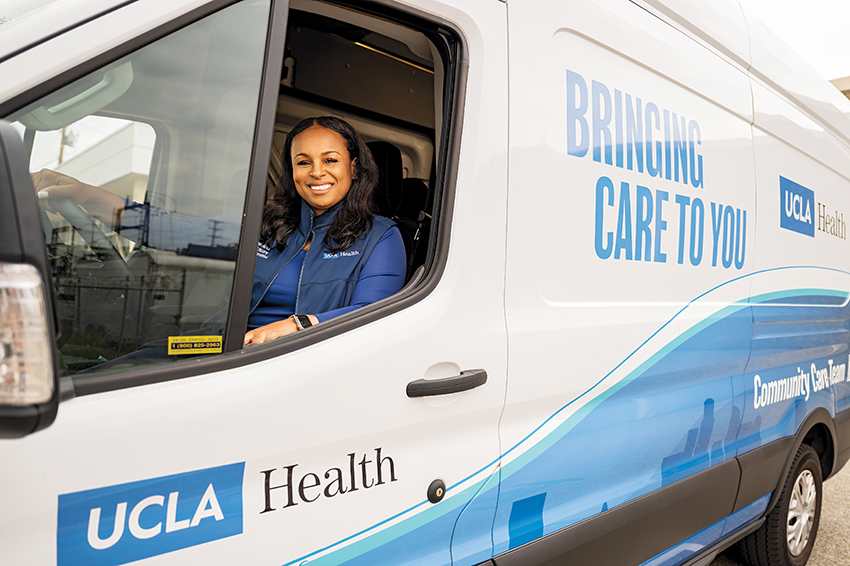My Specialty
Homeless Care Nursing
Providing a bridge to the healthcare system for the unhoused

Candice Grey, RN, BSN, PCCN, CN II
Homeless Healthcare Collaborative
UCLA Health
Please share the arc of your career.
After working in the corporate world, I wanted a career where I could connect with people more deeply. I transitioned to nursing as a second career. I gained clinical experience in solid organ transplant, head and neck surgery, and the MICU before joining the Homeless Healthcare Collaborative in May 2023.
I’ve cared for some of the sickest patients in the hospital, but working with the unhoused has taught me what it truly means to treat the whole person.
What drew you to working with the homeless population?
I come from the same South Los Angeles neighborhood I serve. I understand the barriers my patients face because I’ve walked the same streets. I know how easy it is to fall through the cracks. This isn’t just a job for me — it’s personal.
What does an average workday look like for you?
We huddle each morning with the interdisciplinary team to plan the day’s outreach locations. I then load our street medicine clinical van with medications, point-of-care testing equipment, wound care bag, snack and hygiene kits, and water. Each team travels to various locations throughout L.A. County to provide medical care and assessments.
Our mobile clinic addresses immediate health concerns such as infections, chronic disease management, wound care, and medication refills. We also offer a range of urgent care, primary care, behavioral healthcare, and case management services.
Where do you see patients?
Our goal is to meet people where they are. That can mean encampments; under bridges; along riverbeds; or in parks, transit stations, and alleyways. We respect patients’ space while making sure they know we’re there.
What are the collaborative aspects of your group’s work?
A key aspect of caring for this population is addressing immediate needs while working towards long-term solutions. We collaborate with city and county medical and social service agencies, as well as community clinics, shelters, outreach groups, mutual aid groups, libraries, schools, community centers, soup kitchens, faith-based organizations, and more.
What are your relationships like with your patients?
My patients have taught me so much about resiliency, gratitude, and the strength of the human spirit. They have changed the way I see healthcare, reminding me that healing isn’t just about medicine. I’ve learned to listen more, and to never make assumptions about someone’s story.
Trust is everything. Over time, I’ve built connections by showing up consistently, listening without judgement, and advocating for patients’ needs. For many patients, we’re their only source of care, and I take that responsibility to heart.
What are the greatest challenges in transitioning to this kind of work?
In inpatient care, I was accustomed to guiding patients through a structured plan. Street medicine involves a more patient-led approach.
I had to let go of the urge to “fix” everything, and instead learn to listen actively and empower patients in ways I hadn’t before.
Are there myths about the homeless population that you’d like to dispel?
Homelessness is not a choice. A crisis like illness, job loss, medical debt, natural disasters, domestic violence, or lack of affordable housing can push any of us into homelessness. While some unhoused folks struggle with substance use or mental health, these are often symptoms, not the cause.
Instead of blaming individuals, we need to address issues such as poverty, housing insecurity, and a broken healthcare system. This is why street medicine is critical — we’re a bridge between the healthcare system and the people left behind.
A nurse interested in street medicine should be driven by a genuine desire to support marginalized populations — not just providing care, but also being an advocate.
The unpredictable nature of street medicine demands flexibility, adaptability, and grit. Nurses in this specialty must be prepared for anything. Street medicine can be physically and emotionally demanding, and it requires stamina and perseverance. Despite the challenges, it’s deeply fulfilling to know that you’re making a tangible impact on the lives of those who need it most.
Do you have any goals you’d like to share?
I want to pursue higher education in public health and community-based care so I can provide more effective care and advocate for a more equitable healthcare system.
KEITH CARLSON, RN, BSN, NC-BC, has worked as a nurse since 1996 and offers expert professional coaching at www.nursekeith.com.
In this Article: Career Advice, Mental and behavioral health, Public Health


